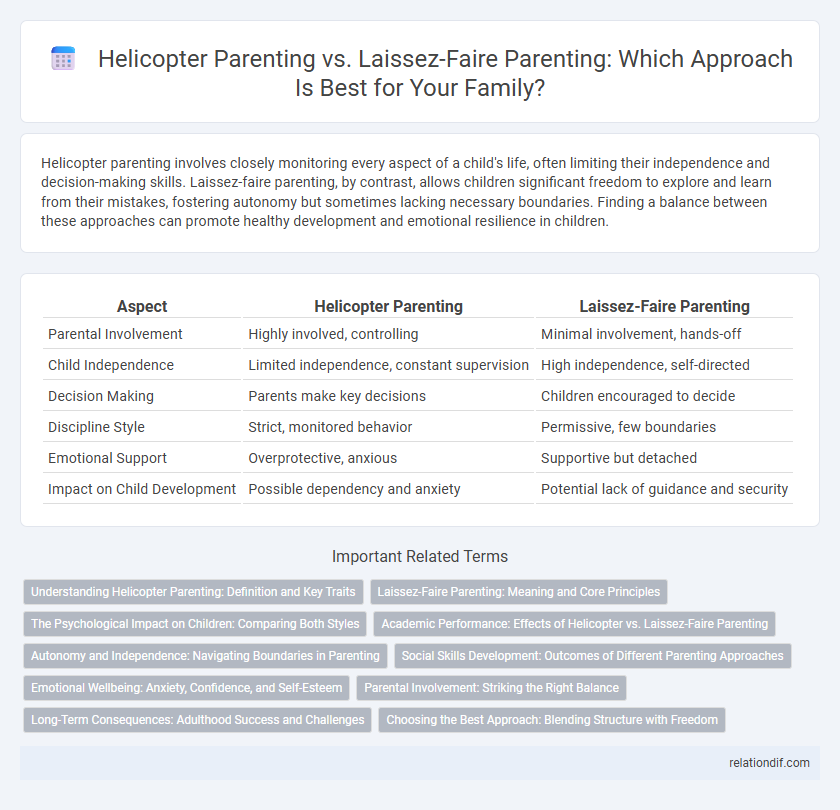Helicopter parenting involves closely monitoring every aspect of a child's life, often limiting their independence and decision-making skills. Laissez-faire parenting, by contrast, allows children significant freedom to explore and learn from their mistakes, fostering autonomy but sometimes lacking necessary boundaries. Finding a balance between these approaches can promote healthy development and emotional resilience in children.
Table of Comparison
| Aspect | Helicopter Parenting | Laissez-Faire Parenting |
|---|---|---|
| Parental Involvement | Highly involved, controlling | Minimal involvement, hands-off |
| Child Independence | Limited independence, constant supervision | High independence, self-directed |
| Decision Making | Parents make key decisions | Children encouraged to decide |
| Discipline Style | Strict, monitored behavior | Permissive, few boundaries |
| Emotional Support | Overprotective, anxious | Supportive but detached |
| Impact on Child Development | Possible dependency and anxiety | Potential lack of guidance and security |
Understanding Helicopter Parenting: Definition and Key Traits
Helicopter parenting refers to an overinvolved approach where parents closely monitor and control most aspects of their child's life to ensure success and safety. Key traits include excessive supervision, high levels of intervention, and a reluctance to allow children to experience failure or independence. This style often leads to reduced autonomy in children and increased anxiety due to constant parental oversight.
Laissez-Faire Parenting: Meaning and Core Principles
Laissez-faire parenting is characterized by minimal interference, allowing children significant freedom to make their own choices and learn from natural consequences. This parenting style emphasizes trust in the child's ability to develop independence, creativity, and problem-solving skills without constant guidance or control. Core principles include respect for the child's autonomy, non-imposition of strict rules, and fostering an environment where open communication and self-regulation are encouraged.
The Psychological Impact on Children: Comparing Both Styles
Helicopter parenting often leads to increased anxiety, low self-esteem, and reduced problem-solving skills in children due to constant supervision and lack of independence. In contrast, laissez-faire parenting can foster autonomy and resilience but may result in feelings of neglect or insecurity if parental guidance is insufficient. Research indicates that balanced parenting styles promoting moderate involvement tend to support optimal psychological development and emotional well-being in children.
Academic Performance: Effects of Helicopter vs. Laissez-Faire Parenting
Helicopter parenting often leads to higher immediate academic performance due to close supervision and intervention in children's schoolwork, fostering short-term success but potentially hindering long-term independence and problem-solving skills. In contrast, laissez-faire parenting encourages self-reliance and autonomy, which can result in variable academic outcomes yet promotes resilience and intrinsic motivation over time. Studies show that balanced parental involvement, blending guidance with autonomy, optimizes academic achievement and emotional development.
Autonomy and Independence: Navigating Boundaries in Parenting
Helicopter parenting often limits children's autonomy by closely monitoring every decision, which can hinder the development of independence and self-confidence. In contrast, laissez-faire parenting promotes autonomy by allowing children to explore boundaries and learn from their own experiences, fostering decision-making skills. Balancing parental involvement and freedom is crucial to nurturing resilient, self-reliant individuals within the family structure.
Social Skills Development: Outcomes of Different Parenting Approaches
Helicopter parenting often limits children's opportunities to develop independent social skills by excessively intervening in their interactions, potentially leading to increased anxiety and reduced problem-solving abilities. In contrast, laissez-faire parenting allows children to navigate social situations with minimal guidance, which can foster autonomy but may result in gaps in understanding social norms and managing conflicts. Balanced approaches that combine supportive involvement with promoting independence tend to produce more adaptive social competence and emotional resilience in children.
Emotional Wellbeing: Anxiety, Confidence, and Self-Esteem
Helicopter parenting often increases children's anxiety by fostering dependence and limiting opportunities to develop problem-solving skills, which can undermine self-esteem and confidence. In contrast, laissez-faire parenting encourages independence and resilience, promoting emotional wellbeing by allowing children to navigate challenges and build self-confidence through personal experiences. Balancing supportive guidance with autonomous decision-making is crucial for fostering healthy emotional development in children.
Parental Involvement: Striking the Right Balance
Helicopter parenting involves intense parental involvement, often leading to overprotection that can hinder a child's independence and decision-making skills. In contrast, laissez-faire parenting offers minimal supervision, which may result in a lack of guidance and support during critical developmental stages. Striking the right balance in parental involvement fosters a nurturing environment where children feel supported yet empowered to develop autonomy and resilience.
Long-Term Consequences: Adulthood Success and Challenges
Helicopter parenting often results in adults who struggle with independence, decision-making, and resilience due to overdependence on parental guidance during childhood. In contrast, laissez-faire parenting may foster self-reliance and problem-solving skills but can also lead to difficulties in social boundaries and emotional regulation if support is insufficient. Studies indicate balanced parenting that blends structure with autonomy tends to produce adults better equipped for career success and healthy interpersonal relationships.
Choosing the Best Approach: Blending Structure with Freedom
Balancing helicopter parenting and laissez-faire parenting requires integrating consistent boundaries with opportunities for independent decision-making to foster resilience and self-confidence in children. Structured guidance paired with age-appropriate freedoms promotes emotional security while encouraging exploration and problem-solving skills. Parents who adapt their approach to their child's evolving needs create a healthy environment that supports both safety and autonomy.
helicopter parenting vs laissez-faire parenting Infographic

 relationdif.com
relationdif.com